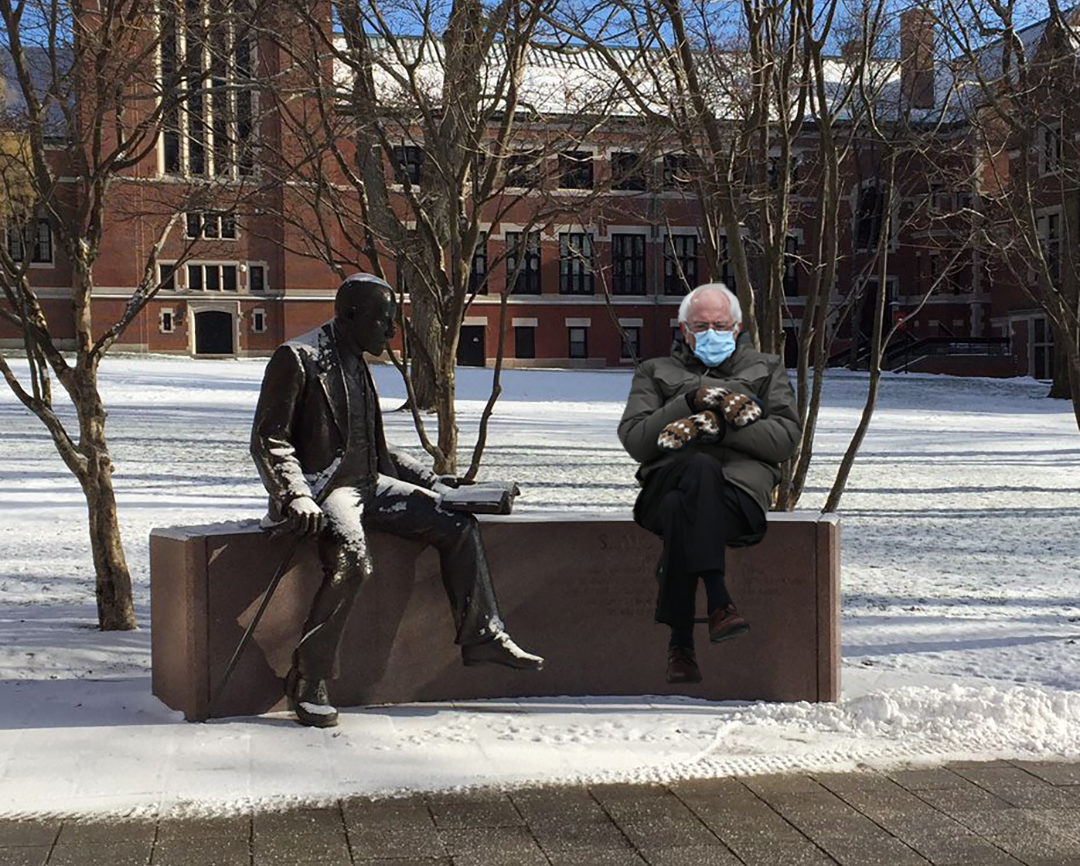Bernie meme makes its way across globe, even reaching Clark’s campus — but why did it go mega-viral?

If you’ve been on social media at any point during the past week, chances are you’ve seen some of the countless memes of Vermont Sen. Bernie Sanders, bundled up in oversized mittens and a brown coat, sitting on a folding chair.
The image of the former Democratic presidential candidate, captured during President Joe Biden’s inauguration, was quickly edited into different scenes transcending art, history, and culture — from iconic film moments to famous paintings, historic photos to everyday places, like the New York City subway.
In one meme, Sanders appears on the Iron Throne from the hit television series, “Game of Thrones.” In another, he’s given a seat at the table in Leonardo da Vinci’s “Last Supper.” Sanders even appears on Clark University’s campus in one post shared by the Screen Studies Program, sitting on a bench in Red Square next to the statue of Sigmund Freud.
But why did the Bernie meme take off like it did, reaching all corners of the internet and shared by people across the globe? There are a few reasons, according to Screen Studies Professor Hugh Manon.
“It’s a perfect distillation of the ‘Bernie attitude’ — grassroots, unpretentious, ‘of the people’ — but mainly it exploded across the internet because it’s a super easy meme to master,” he says. “Basically, Bernie seemed out of place at the inauguration, so anywhere that he is out of place, he ‘fits’ perfectly in the meme renditions.”
The political climate also played a role in why the meme became so popular, according to Manon. He says the original televised image of Sanders felt like a mild rebuff to Biden, his former political opponent, but described it mainly as a comforting “chicken soup” moment at the end of four intense, chaotic years.
Manon teaches a course on Meme Culture and Comedy Theory at Clark, which explores “meme culture” through a psychoanalytic lens to not only understand our love for memes as a communication medium, but also to understand the nature of human subjectivity vis-à-vis humor, jokes, and laughter. He explains that people enjoy the challenge of finding new scenes to photoshop Sanders into — a type of reverse “Where’s Waldo,” as he calls it. “Part of the appeal is to see how ‘niche’ you can make your placement,” he explains.
Listen to Prof. Manon discuss Meme Culture & Comedy Theory on the Add/Drop podcast:
Manon even participated in the trend himself, creating the meme of Sanders and Freud that garnered a record amount of engagement on the ClarkUScreen Instagram account, with more than 900 “likes” to date. “The timing was ideal,” he says. “I posted it pretty early on in the trend.”
So why have memes grown in popularity over the past decade, becoming an ever-present part of the online experience? Manon says it’s because humans enjoy repetition and variation, which produce desire, amusement, and laughter. Memes are a mechanism for that to occur.
“It’s primal,” he says, adding that Freud — who coined the term “repetition compulsion” — would agree.
The most successful memes usually involve taking a long-familiar media snippet and combining it with a current event or recent trend, Manon explains, but there isn’t one tried-and-true method.
“Laughter is a difficult thing to commodify or construct from a recipe,” he says. “The best humor is something you almost can’t try to achieve. The Bernie/Freud meme just came to me out of the blue. I wasn’t thinking about it at all, and then suddenly the juxtaposition came to mind, and I ran to my laptop and opened up Photoshop.”
The purpose of memes also varies just as widely. As they’ve become a ubiquitous influence in our daily lives, memes have evolved into popular vehicles for everything from light observational humor to political indoctrination. And they can have far-reaching effects. A handmade crocheted doll inspired by the Bernie meme reportedly raised more than $40,000 for Meals on Wheels America when it sold in an online auction this week.
“One thing my meme class has taught me is that if you want to talk with students about one thing they all know well, and will be eager to discuss, just bring up the subject of memes,” Manon says. “In 2021, meme fluency is the ultimate form of pop-cultural currency.”


